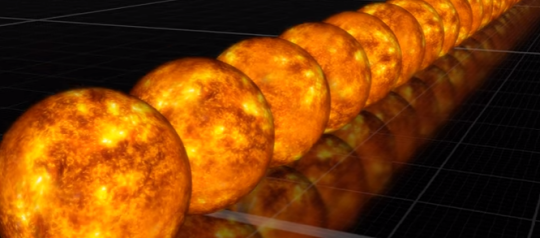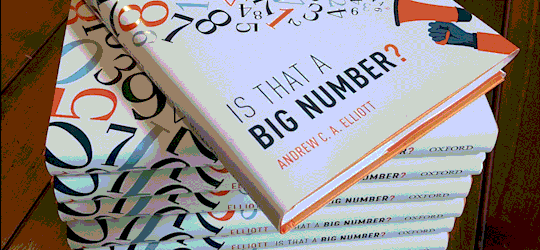
Enter the chance as eg: '3%', '1 in 1000', '100 to 1', '2:1', '0.075', '7 in 36'

IsThatABigNumber.com is about extending our number sense. We make comparisons that are (mostly) down-to-earth: populations of people and animals, national budgets, river lengths and so on.
But when we leave behind everyday experience and look at the kind of numbers you find in astronomy and in combinatorics, we come across vastly bigger numbers.
One strategy to grasp these numbers is to break them down into a series of levels, to see them as stupidly big aggregations of things that are themselves stupidly big aggregations of … Here are some good clips illustrating this:

Is That a Big Number is now a book, published by Oxford University Press. (Google ISBN 0198821220 to find many online booksellers). Although there is serious purpose behind the book - to explore how we think about numbers and how we can understand big numbers - it’s written in a light and engaging style.
Entertaining, full of practical examples, and memorable concepts, Is That A Big Number? renews our relationship with numeracy. If numbers are the musical notes with which the symphony of the universe is written, and you’re struggling to hear the tune, then this is the book to get you humming again.
$267 billion in tariffs. Is That a Big Number?
Misplaced decimal point endangers lives
Violent Crime Rate in the USA: 50% down from peak 25 years ago
Making Sense of Air Pollution Statistics
2,043,599 Pennies is a big number but is it Art?
How old are Olympians? (for each sport)
GDP: a Predictor of Olympic Gold?
Guide to Spotting Dodgy Statistics
HK-Zhuhai-Macao Bridge Meets in the Middle
200 Terabyte Mathematical Proof

Not all advances in technology stem from well-planned development projects. Sometimes accidents turn out to be fortuitous. In 2003 Jamie Link shattered a silicon chip, and discovered the fragments were still transmitting signals. “Smart Dust” was the result: microelectomechanical devices with a host of applications. It’s not the only invention to be the result of chance. Read more here:
https://newhumanist.org.uk/articles/4852/science-and-serendipity-famous-accidental-discoveries
Five reasons that we find it hard to think about uncertainty. To be published by Oxford University Press in 2021.